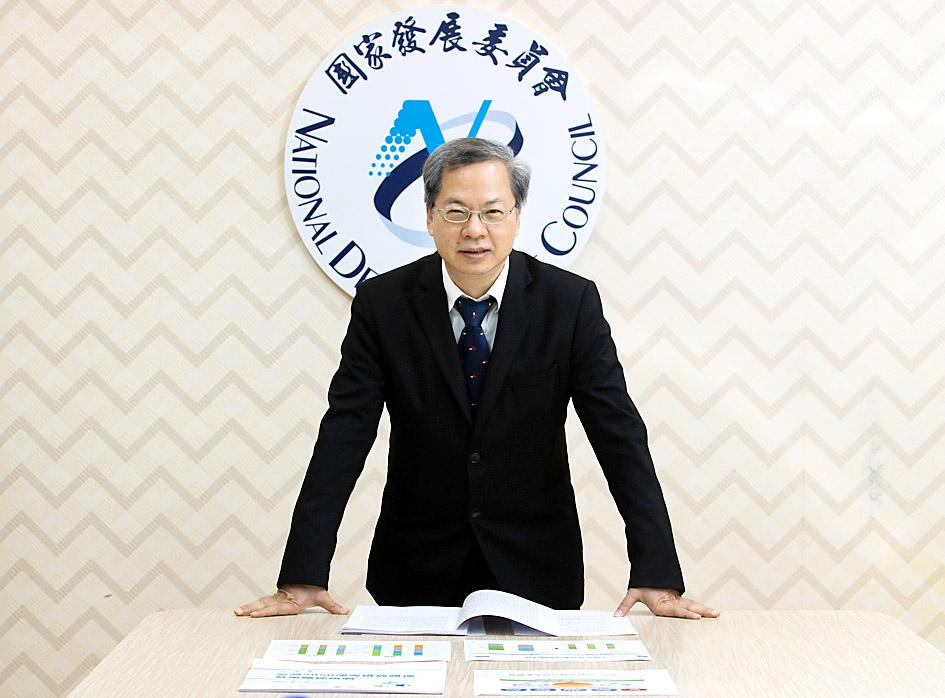Taiwan would continue to enhance its role in global supply chains in a bid to join the US-led Indo-Pacific Economic Framework (IPEF), National Development Council Minister Kung Ming-hsin (龔明鑫) said.
In an interview with Voice of America, Kung said that global supply chains have undergone a restructuring amid US-China trade tensions and the COVID-19 pandemic.
Many Taiwanese companies have remained resilient during the restructuring, Kung said, adding that they benefited from the changes and ensured Taiwan’s economic growth.

Photo: CNA
The nation’s economy last year grew 6.57 percent and is expected to grow 3.91 percent this year, he said.
Taiwanese firms have been moving their production from China to Southeast Asia, North America, and central and eastern Europe, he said, adding that the changes are expected to bolster global supply chains.
Taiwan has become a role model in the global supply chain, and it will continue to bolster the resilience of its investors and strengthen their role in global supply chains, Kung said.
Taiwan is qualified to join the IPEF, he added.
The White House on May 22 announced that Taiwan had not been invited to join the IPEF, which was unveiled by US President Joe Biden a day later during his visit to Asia.
In the first round, 13 economies accounting for about 40 percent of the world’s GDP joined the trade pact: the US, Japan, Australia, New Zealand, Brunei, India, Indonesia, South Korea, Malaysia, the Philippines, Singapore, Thailand and Vietnam.
US National Security Adviser Jake Sullivan said Washington was looking to deepen its economic relationship with Taipei, in particular on “high-technology issues, including on semiconductors and supply chains.”
The IPEF focuses on four major themes: fair and resilient trade, supply chain resilience, infrastructure, clean energy and decarbonization, and tax and anti-corruption, with further details expected later.
Despite a lack of detail, Kung said the IPEF expresses the US’ intention to return to Asia by mapping out a strategy in the Indo-Pacific region.
Taiwan has already been working to improve its performance in the four areas identified by the IPEF, he said.
Based on the IPEF’s themes, Taiwan would promote building smart cities, improve cross-border privacy and endeavor to achieve net-zero carbon emissions by 2025, he added.
However, the nation cannot develop supply chains and enter new markets on its own, Kung said.
It has to cooperate with other nations, which is why Taipei is keen to seek bilateral or multilateral cooperation in global trade, he said.
Taipei and Washington resumed talks under the Trade and Investment Framework Agreement mechanism last year after a five-year hiatus.
Both sides have also hosted digital economic forums, Kung said.
Taiwan has also begun conducting closer economic exchanges with central and eastern Europe, he said.

Intel Corp chief executive officer Lip-Bu Tan (陳立武) is expected to meet with Taiwanese suppliers next month in conjunction with the opening of the Computex Taipei trade show, supply chain sources said on Monday. The visit, the first for Tan to Taiwan since assuming his new post last month, would be aimed at enhancing Intel’s ties with suppliers in Taiwan as he attempts to help turn around the struggling US chipmaker, the sources said. Tan is to hold a banquet to celebrate Intel’s 40-year presence in Taiwan before Computex opens on May 20 and invite dozens of Taiwanese suppliers to exchange views

Application-specific integrated circuit designer Faraday Technology Corp (智原) yesterday said that although revenue this quarter would decline 30 percent from last quarter, it retained its full-year forecast of revenue growth of 100 percent. The company attributed the quarterly drop to a slowdown in customers’ production of chips using Faraday’s advanced packaging technology. The company is still confident about its revenue growth this year, given its strong “design-win” — or the projects it won to help customers design their chips, Faraday president Steve Wang (王國雍) told an online earnings conference. “The design-win this year is better than we expected. We believe we will win

Chizuko Kimura has become the first female sushi chef in the world to win a Michelin star, fulfilling a promise she made to her dying husband to continue his legacy. The 54-year-old Japanese chef regained the Michelin star her late husband, Shunei Kimura, won three years ago for their Sushi Shunei restaurant in Paris. For Shunei Kimura, the star was a dream come true. However, the joy was short-lived. He died from cancer just three months later in June 2022. He was 65. The following year, the restaurant in the heart of Montmartre lost its star rating. Chizuko Kimura insisted that the new star is still down

While China’s leaders use their economic and political might to fight US President Donald Trump’s trade war “to the end,” its army of social media soldiers are embarking on a more humorous campaign online. Trump’s tariff blitz has seen Washington and Beijing impose eye-watering duties on imports from the other, fanning a standoff between the economic superpowers that has sparked global recession fears and sent markets into a tailspin. Trump says his policy is a response to years of being “ripped off” by other countries and aims to bring manufacturing to the US, forcing companies to employ US workers. However, China’s online warriors